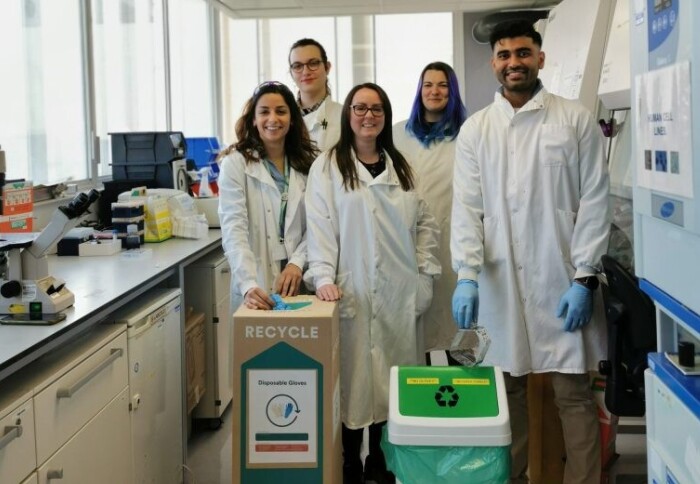Centre for Inflammatory Disease awarded Gold LEAF Award
by Meesha Patel

The centre in the Department of Immunology and Inflammation is the first lab in the Faculty of Medicine to receive a Gold Award.
The Centre for Inflammatory Disease (CID) Green Team led by Dr Kerry Rostron-Barrett, Laboratory Manager and Section Safety Coordinator undertook the assessment as part of Imperial College London’s commitment to a more sustainable Imperial.
Established by UCL, the Laboratory Efficiency Assessment Framework is an accreditation scheme designed to improve sustainability within higher education teaching and research. The first Gold LEAF certificate was awarded at Imperial College London in 2021-22 and the framework allows laboratory managers from all departments to quantify their environmental and financial impact.
"Laboratory-based research, though essential, is extremely energy and resource intensive, using three to ten times more energy per meter squared than a typical office." Dr Kerry Rostron-Barrett Department of Immunology and Inflammation
The CID was awarded a Silver LEAF award earlier this year but their ongoing efforts were rewarded with Gold status. This involved increased reuse of lab materials, actions to reduce work associated travel, increased engagement with the Estates team to alter ventilation requirements in non-critical areas, more comprehensive cataloging of samples and chemicals and promoting the use of existing samples and data in favour of generating new samples.
Dr Kerry Rostron-Barrett said: “Laboratory-based research, though essential, is extremely energy and resource intensive, using three to ten times more energy per meter squared than a typical office.”
“We have implemented a number of actions which have resulted in a significant reduction in the amount of laboratory waste generated, consumption of single use plastics, water and energy – ultimately resulting in markedly reduced running costs and carbon footprint.”
Creating a more sustainable laboratory
Making a laboratory of this size and scale energy efficient and more sustainable is a challenging task. The CID laboratory occupies 547.42 m² of space at the Hammersmith Campus and conduct scientific and medical research in laboratory dishes (in vitro) and in animals (in vivo).
Contamination can be a problem in these experiments therefore single-use plastics can often be necessary. A few examples of the changes made were increasing the temperature of freezers, making recycling bins available so that non-contaminated lab plastics and single use gloves could be recycled, consolidation of consumable orders and making sure that equipment is stickered with ‘traffic light’ system stickers to highlight which equipment can or cannot be turned off at the end of each working day.
"This Gold LEAF award for CID has demonstrated the largest carbon savings of any laboratory application across Imperial with approximately 23 tonnes of CO2 emissions and £34,000 of energy saved each year." Ben Gray Property & Major Projects
Ben Gray, Sustainability Initiatives Coordinator in Property & Major Projects said: “This Gold LEAF award for CID has demonstrated the largest carbon savings of any laboratory application across Imperial with approximately 23 tonnes of CO2 emissions and £34,000 of energy saved each year, a large contribution! All these savings in lab spaces are vital for our campuses to reach our Net Zero targets by 2040.”
“The CID team have not only made fantastic contributions to energy savings but have also shown great innovation to re-think the way they use consumables, making sizable reductions in the amount of plastic purchased in their lab and something which can be showcased to many other laboratories at Imperial.”
Professor Marina Botto, Head of Department said: “This result fills our Departmental community with pride. I am thrilled to see the CID Green Team was recognised for their outstanding commitment and efforts to improve the sustainability of our laboratories. It is inspiring to see all the changes they have implemented in the laboratory without compromising the quality of the research - it is testament of the real impact we can all make if we adapt our way of working”
Professor Matthew Pickering, Head of the CID said: "This was a transformative initiative and our Green Team led by Dr Kerry Rostron-Barrett wholeheartedly deserve the Gold status. They have shown how we can make impactful changes to sustainability through innovative changes to our laboratory practice."
Article text (excluding photos or graphics) © Imperial College London.
Photos and graphics subject to third party copyright used with permission or © Imperial College London.
Reporter
Meesha Patel
Faculty of Medicine Centre